Art Windsor-Essex is always learning how to better serve our community by clearly defining and living up to our organizational values.
- Home
- Our Values
Our Values
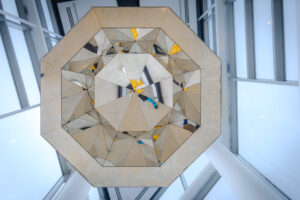
Equity
Art Windsor-Essex is always learning how to better serve our community and we have an ongoing commitment to diversity, equity, accessibility and inclusion. We understand the work required to become community-driven will continually change. The work is an ongoing effort, and will never be finished.
We acknowledge that in the past, the gallery has been elitist and inaccessible. We take this to heart, and we are dedicated to changing our policies, and our approach to our exhibitions and programs to create a welcoming visitor experience.
Our staff and volunteers are working together to ensure Art Windsor-Essex is a space where all visitors feel welcomed and included. Together, we are forging a path to strengthen community trust to form lasting collaborative relationships with individuals and groups. We invite you to participate in this transformation.
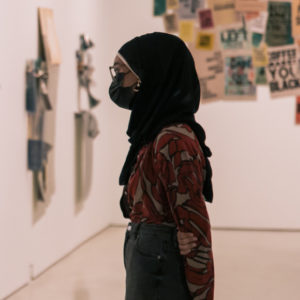
Decolonization
All AWE team members are required to read the Truth and Reconciliation Commission of Canada: Calls to Action, and the United Nations Declaration on the Rights of Indigenous Peoples. We seek a better understanding of the legacy of the Residential Schools system to support our own Indigenous community when they affirm their rights. The Gallery addresses the Calls to Action in our exhibitions and programming and in the care and growth of our collection. In the spirit of reconciliation, we offer free admission for Indigenous Peoples (First Nations, Inuit and Métis).
Our goals are:
- Being good hosts and guests on this territory
- Inviting the Indigenous community into the Gallery
- Meeting Indigenous community members within Indigenous-run spaces
- Hosting initiatives that engage Indigenous students, artists, and community members of all ages.
- (Re)allocating resources for initiatives that support the growth and well-being of Indigenous people
- Prioritizing space within the Gallery’s physical building, programming schedule, exhibition selection and special events
- Provide opportunities for partnerships and collaborations between the Indigenous community and non-Indigenous artists.
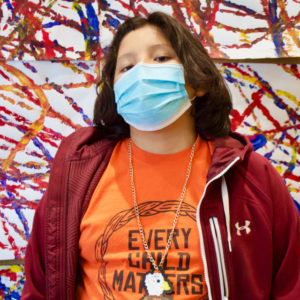
Land Acknowledgment
Territorial Acknowledgment: Art Windsor-Essex respectfully acknowledges that we are located on Anishinaabe Territory – the traditional territory of the Three Fires Confederacy of First Nations, comprised of the Ojibway, the Odawa, and the Potawatomi. Today the Anishinaabe of the Three Fires Confederacy are represented by Bkejwanong. We want to state our respect for the ancestral and ongoing authority of Walpole Island First Nation over its Territory.
Truth and Reconciliation Statement: AWE is committed to working with reciprocity—engaging with Indigenous community members to build programs and exhibitions led by and for Indigenous people. We acknowledge AWE has a responsibility to move communities to action around Truth and Reconciliation so that together we can thrive on this territory.
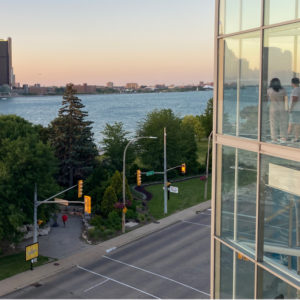
Accessibility
In consultation with the community, AWE has prepared an Accessibility Policy, which was adopted in September of 2022.
Did we miss something? Help us improve by sharing your thoughts or concerns. Email visit@artwindsoressex.ca or call Visitor & Membership Services: 519-977-0013 ext.117
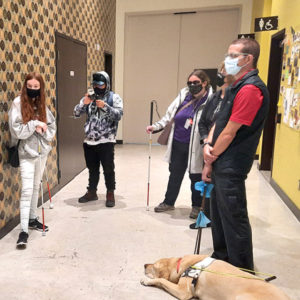
Statement on Freedom of Expression
Art Windsor-Essex (AWE) is committed to creating conversations. AWE is a welcoming space for everyone, offering different ideas and ways of thinking through our programs. AWE believes that art has the power to inspire intellectual and personal growth and to drive change in our community.
AWE supports the Canadian Charter of Rights and Freedoms which guarantees fundamental freedom of thought, beliefs, opinions and expression for all. While some of the ideas AWE presents through our programs may be challenging, the gallery’s commitment to diversity includes diversity of thought. AWE supports the right of every individual to hold and express their thoughts, ideas and opinions provided they do not violate the Ontario Human Rights Code, or Canada’s Criminal Code.
AWE does not condone hate speech and does not tolerate any form of discrimination based on the identifiers in the Ontario Human Rights Code. Equity and inclusion are key values integrated into all areas of the gallery’s work. You can discover more about AWE’s commitment to equity as a core value, the values that align with our mission and strategic pillars by visiting our galleries, and attending our programming and events.
DEAI Action Plan
AWE harnesses the power of art to open people’s minds and hearts. We promise to challenge our visitors’ ideas and perspectives with every visit. We are transforming into a place of inclusivity and discovery: a person-centred and community-driven art gallery for the 21st Century.
In September 2020, AWE formally engaged consultants from Warp and Weft (W&W), a diversity, equity, and inclusion (DEI) consultancy, to conduct a consultation with AWE staff, Board, volunteers, and community stakeholders. The results of this consultation and accompanying recommendations were presented to AWE’s Board in Spring 2021. In Fall 2021, a group of AWE staff, largely from equity-seeking groups, formed an internal DEAI (diversity, equity, accessibility, and inclusion) task force.
With the support of the Governance Committee, AWE’s Board, and an external equity consultation group, the internal DEAI task force prepared an equity statement for the organization, and a preliminary implementation plan for the W&W report’s recommendations. The institution agreed to implement 75% of the report’s recommendations by the end of 2023.
One of the report’s recommendations is to develop and implement a clear DEI action plan with measurable and defined objectives, deliverables, and outcomes. This document articulates the work the organization will undertake through 2023 to ensure AWE becomes a more equitable and inclusive space for everyone – a place where exciting things are happening, and where everyone feels like they belong.
To advance our journey towards equity, we recognize that the following strategies will be key to our success:
- Community Engagement and Consultation: We will attract and retain diverse leadership, staff, and volunteers who are fully invested in developing inclusive and accessible programs. We will cultivate meaningful partnerships with community groups to increase participation of historically underserved communities in our programs. We will employ a ‘nothing about us, without us’ approach to the work we undertake, engaging in meaningful consultation with people who possess lived experiences of the issues and topics we explore through our activities. We will ensure the diversity of our community is reflected in our programs, our art collection, our approach to education, and our promotional materials.
- Education and Training: All staff, board, and volunteers will receive regular training on topics that support our equity and anti-racism efforts. We will set aside professional development funds each year to ensure everyone engaged with the organization participates in education around equity and anti-racism.
- Leadership commitment: Our Board has signed on to the Government of Canada’s 50-30 Challenge, and will strive to achieve a minimum 50% gender parity on our Board and leadership, with a minimum of 30% of our volunteer leadership coming from equity-seeking groups. Our Board Chair, Executive Director, and Managers will champion inclusion through their determined leadership and deliberate efforts to cultivate leaders from across various communities in Windsor-Essex. Members of the Board and Management will commit to reviewing institutional policies and procedures on an ongoing basis to ensure that the organization can reach its identified DEAI goals.
While there are several acronyms in common use today, we have chosen, for consistency, to use the acronym DEI throughout this action plan. While these terms have various definitions, for the purposes of this action plan, the organization defines the terms equity, diversity and inclusion as follows:
Diversity: The presence of a wide range of human qualities and attributes – with which we are born and gain through experience. These include age, race, ethnicity, gender, physical and mental ability, sexual orientation, educational background, socioeconomic status, marital status, language, and lived experience, among many others.
Equity: The outcome of policies and actions that create a more diverse and inclusive institution that reflects its community.
Inclusion: The actions taken to confront historical exclusion or underrepresentation and bringing those affected into decision-making to increase awareness, address disparities and foster understanding, so that all feel welcome and valued.
Within the next two years, we will:
Community Consultation
- Consult with Indigenous nations and groups to continue to evolve our practice of acknowledging the land
- Regularly engage First Nations and Indigenous groups in discussions about how AWE can support Indigenous-led initiatives, activism, and work toward reconciliation
- Build meaningful partnerships with organizations with strong connections to the local community and members of equity-seeking communities, identifying and pursuing meaningful opportunities for collaboration
- Develop a network of individuals, groups, and organizations that have strong connections with local diverse communities, to help advertise opportunities for involvement with the gallery (paid and volunteer)
- Create short-term advisory bodies to help inform our DEI and decolonizing objectives, incorporating local and traditional knowledge
Access
- Commit to providing ASL translation and closed-captioning at all public events and create an action plan and timeline for achieving this
- Review physical accessibility of all spaces through a critical disability lens and principles of universal design – engaging both experts and “non-experts” (i.e. people with lived experience of disabilities) to evaluate barriers to full access
- Build a community use protocol that facilitates access to space rental/pro bono use for priority communities and groups who have historically faced barriers to access
- Adopt language and translation policies that increase access for priority communities, e.g. ASL, closed-captioning, translation to Windsor-Essex’s most-spoken languages after English
Training
- Retain external mentors to support staff and leadership development, especially for staff who represent priority communities and are more likely to experience minority stress
Policy & Policy Statements
- Identify aspects of our governance and leadership structure that currently act as barriers to diverse candidates joining Board and Leadership roles; making a special focus on Black, Indigenous and other racialized people; and commit to an action plan for removing these barriers
- Enable greater selection of preferred caterers that meet diverse needs and desires of community groups
- Make it possible for community partners and groups to bring in their own culturally-sensitive security staff for events
- Develop a formal policy on how AWE deals with artworks in its collection that may be offensive or likely to cause harm to priority communities
- Develop a policy for ensuring DEI principles are applied to borrowed exhibitions
Representation
- Immediately prioritize acquiring new works that make meaningful strides toward addressing the well-known gaps in AWE’s collection, especially works by artists who represent priority communities and their cultures and traditions
- Conduct research on how best to decentre Western/Eurocentric cultural values and norms in the acquisition strategy
- Develop a formal artistic advisory committee that ensures curatorial staff have access to a diverse sounding board for their ideas and proposals
- Review curatorial strategy and selection criteria for exhibitions and make changes as necessary to decentre Eurocentric norms and give greater privilege to the histories, traditions, and aesthetics of the cultures of priority communities
- Develop proposals for decentring Western/Eurocentric cultural values and norms in the acquisition strategy, engage with like-minded arts museums to collaborate, and consult with priority communities throughout that process
- Implement a careful review of pieces in the collection that maintain or promote Western/Eurocentric cultural values and that may cause harm or offense to priority communities
- Set targets and clear timelines for expanding the focus of the collection to reflect the diversity and history of artistic practices in priority communities